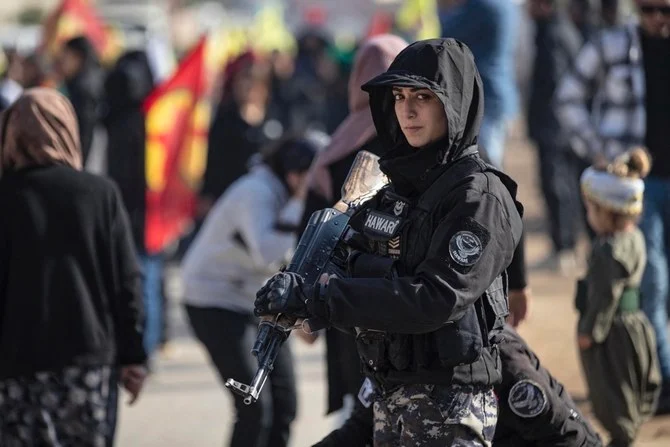
- ARAB NEWS
- 13 Jul 2025

Turkiye launched airstrikes against targets in northern and eastern Syria on Nov. 19. The bombardment by warplanes, drones and artillery killed many civilians and members of the Syrian Democratic Forces, the leading partner of the US in the multilateral anti-Daesh coalition.
Turkish President Recep Tayyip Erdogan warned that the strikes “are just the beginning.” There was well-documented cooperation during the operation between the Turkish National Intelligence Agency and Syrian Islamists.
Since 2016, nearly 60,000 fighters from more than 100 countries have passed through Turkiye to enter Syria. The Turkish intelligence agency provided them with logistical support, money, weapons and even arranged for Islamists wounded on the battlefield to receive medical care in Turkish hospitals.
In contrast to Turkiye’s duplicity, the Kurds are indispensable allies of the US. The SDF, at the heart of which are Kurds, was the spearhead against Daesh. Now, Turkiye is massing additional forces along the Syrian border and threatening a massive cross-border operation — and wants to inspire a prison break so that Daesh members can join this phase of the fight.
Al-Hol camp in northern Syria is a hotbed of Islamists ready to fight. It was established in 1991, during the Gulf War, as a haven for Iraqi refugees. It is located 12 km from the border with Iraq and 70 km from areas occupied by the Turkish army east of the Euphrates River.
About 55,000 relatives of Daesh fighters live there, including 25,000 Iraqi refugees, 20,000 Syrians and 8,000 from other countries. Residents of the camp include more than 10,000 extremist fighters from 52 countries, and Turkiye seeks to achieve its own goals by creating chaos so that these fighters can escape.
In 2019, Turkiye invaded the town of Tal Abyad and bombed the area near the Ain Issa camp. Daesh members and their families took advantage of the chaos to flee toward Turkiye but the SDF arrested them. In January this year, Turkish-backed extremists organized a prison break from Al-Hasakah camp but, once again, the SDF thwarted the attempt.
The area around Cirkin Prison in Qamishlo was also targeted by Turkish airstrikes that helped Daesh fighters escape and join the Syrian National Army, a terrorist force under Turkish control.
There is a belief that by labeling the Kurds as terrorists, the ruling party will mobilize the Turkish nationalist base to rally around the AKP.
Maria Maalouf
SDF members from Syrian villages along the border with Turkiye fear for the safety of their wives and children and therefore feel obligated to protect their loved ones. The Turkish armed forces are massing along the border in preparation for an invasion, and will attack the SDF unless the US can deter them.
The SDF expects the US to warn Ankara that there will be a heavy price to pay for any aggression against the SDF.
We can speculate about Erdogan’s motives in all of this. Domestic support for his Justice and Development Party has been declining significantly in the run-up to national elections in June next year and there is a belief that by labeling the Kurds as terrorists, it will mobilize the Turkish nationalist base to rally around the party.
A complete and independent investigation will clear the Kurds of involvement in the terrorist bombing in Istanbul on Nov. 13 this year. Meanwhile, the US should support the SDF to help maintain order in the camps where Daesh members and their families reside.
The US and the SDF are natural allies, committed to democratic federalism, the empowerment of women, and environmental sustainability. Turkiye is a NATO ally but the Kurds are good friends of the US in its fight against violent extremism.
• Maria Maalouf is a Lebanese journalist, broadcaster, publisher and writer. She has a master’s degree in political sociology from the University of Lyon.
Twitter: @bilarakib